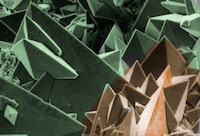



Kidney Stones
20% Higher Incidence of Stones in PKD
PKD'rs have low citrate in their urine. This is called hypocitraturia. It can contribute to kidney stone formation. Those PKD'rs who form kidney stones are helped with potassium citrate.
Passing a kidney stone is generally very painful. It can be diagnosed through imaging or if the stone has already passed, the doctor may give you a mesh cup to strain any urine. You might be asked to strain your urine through a filter to catch any possible gravel that can help determine what type of kidney stone you have. Knowledge of the type of kidney stone can aide in the prevention of future stone formation.
Types of Kidney Stones
If your doctor determines that you have a calcium stone (the most common type for PKD'rs) then Shohl's solution or potassium citrate is an old time remedy for these kidney stones. Do not take sodium bicarbonate. With PKD this can increase the chances for kidney stone formation. Pain relief will be given immediately, usually in the form of narcotics. If your urine is too acid you will need to maintain a constant alkaline pH, increase water intake, and eliminate the use of too many proteins.
Calcium Carbonate Stones
Urocit K and polycitra syrup are two forms of potassium citrate, a very strong alkalizer. These medications are useful for preventing future kidney stone formation. Taking in a high salt diet increases the amount of calcium excreted in the urine. This can promote the formation of calcium stones. You may also be asked to avoid caffeine. Two separate studies found caffeine and protein to be the primary factor in increasing the chances for developing more kidney stones. Kidney StonesUric Acid Stones
If you have an oxalate stone, your doctor may suggest avoidance of high oxalate foods such as spinach, rhubarb, beets, strawberries, wheat bran, nuts and nut butters. Naturopathically it is recommended that one, alternate freshly squeezed apple juice with freshly squeezed lemon juice each hour. The avoidance of purine rich meats helps prevent uric acid stones. Already with PKD we have a high uric acid level. The primary treatments are to alkalinize (citrate) and dilute the urine (large water intake). The large water intake also shuts down vasopressin which in turn minimizes kidney cyst growth.Struvite Stones
Are caused by multiple urinary tract infections. Working with your physician try to eliminate the infection source. Sometimes it can be the angle of your ureter; sometimes it is related to a gel or lubricant; and other times the source of the infection remains hidden. Struvite stone formers are asked to drink cranberry and blueberry juice both acidify the urine preventing bacteria from clinging to bladder walls.Cystine Stones
result from a genetic disorder that causes cystine to leak through the kidneys and into the urine, forming crystals that tend to form kidney stones.
Nephrolithiasis improved with magnesium and potassium citrate
Nephrolithiasis trial with potassium citrate
Potassium Citrate kidney stone trial
Potassium Citrate polycitra- K prescribing information
Potassium Citrate bio of G. Tanner and publications
Potassium Citrate Urocit dose chemical structure
Potassium Citrate Urocit contraindications
Potassium Citrate Diminishes Kidney Stone Reoccurrence
Caffeine causes an increase in kidney stone formation
Low Oxalate Diet
Italians Study Found Too Much Protein ↑ Kidney Stones
A study from Italy was done to determine the correct diet for chronic kidney stone formers. Participants wanted to prevent future kidney stones. Each participant drank 3 liters of water daily. Their daily protein intake was determined by laboratory testing. The hypothesis was would dietary calcium cause an increase in kidney stone formation? It was determined that dietary calcium was not the culprit. It was eating too much protein. It was thought that dietary calcium might precipitate kidney stone formation. Participants used the same guidelines. Participants gladly cut back on their protein intake to assure no further development of kidney stones.
